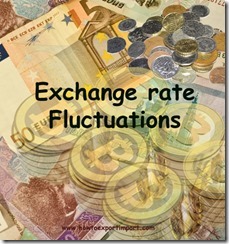The information provided here is part of Online export import business guide course
Do Exchange rate fluctuations effect Export Business?
This topic explains different levels where exchange rates are dealt with, when handling export activities.
Export means earning of foreign currency by moving goods outside country.
When handling day to day activities in import export trade, you will be hearing the word – ‘exchange rate’ many times. Let us discuss some of them:
Exchange rate at the time of entering in to contract:
Once you got an importer to buy your goods, you enter in to a business contract with your overseas buyer. Your buyer may insist you to quote price of your goods in US Dollars, Euro Dollars or in any other foreign currency. In some cases, you may be asked to quote in foreign currency of overseas buyer’s country. You can convert your selling price in to the currency which the buyer required to be quoted.
Here the question is how does exchange rate affect such business contract?
Ok, you have contracted your selling price in foreign currency as per the requirement of buyer. The term of payment could be advance payment, Documents against acceptance, Documents against payment after a period of time of export, Letter of credit at sight, and Letter of credit with credit period of some months after exports. The point is, you receive amount of your sale of goods after duration from contracting time except under advance payment. (Advance payment transactions are a great deal in any business for a seller). At the time of maturity of payment, the exchange rate of foreign currency could be either fall down or rise up. Either you may loose or gain. Right?
Exchange rate at the time of advance receives
You may receive foreign currency at the time of receiving advance amount on a particular shipment to be exported. The overseas buyer provides you advance payment on your request to procure goods, pack and export.
payment on your request to procure goods, pack and export.
If you receive foreign currency at the time of weakening your local currency, you may have to spent more amounts to procure your material for export. Am I right? In turn, if you receive foreign currency at the time of strengthening your local currency, you get benefit out of such situation and gains to you. Right?
Exchange rate at the time of receiving realization of export proceeds
On maturity of payment as per the agreed contractual period between you and your foreign buyer, the amount will be sent to you by your overseas buyer through his bank to your bank. If you want to withdraw the said amount, the said foreign currency has to be converted in to your local currency. So, fluctuation in exchange rates at the time of realization of export bills effects the profit of any sales in exports.
Exchange rate while discounting / negotiating bills
Once after shipping the goods to your foreign buyer, you can discount export bills with your bank and avail amount from your bank. If the contract is under letter of credit, you can negotiate the amount and get your money with your account. The discounting or negotiating bank converts your invoice proceeds in to local currency and arrange to credit the amount in to your account.
The exchange rate at the time of discounting export bills or negotiating under terms of Letter of Credit and the exchange rate at the time of receiving amount from overseas buyer could be varied. The difference amount could be a loss or gain as explained above.
Exchange rate to buy foreign currency while planning for an overseas trip.
As an Exporter, you may have to travel overseas for various business purposes or a personal pleasure tour.
If you would like to visit foreign country, either for an official trip to meet your customers or for a pleasure trip, you need foreign currency to meet the expenses. You can approach your bank and convert your local currency in to foreign currency. So, this is another situation where in you handle exchange rates during your career in exports and imports.
Customs exchange rate:
When you file documents for exports or imports with customs department, if the commercial invoice is in foreign currency, customs converts in to local currency to find the assessable value of goods. This assessable value determines import or export duty payable by you if applicable.
Although exchange rates affect exports as per above reasons, there are some measures to stop such variations in foreign currencies . ‘Blocking’ of exchange rates with banks, maintaining an EEFC account – Exchange Earners Foreign Currency account – etc. are some of the remedies to stop exchange rate variation.
Have you satisfied with this article about ‘exchange rate of foreign currency effect export businesses?
Would you like to express your experience in handling exchange rate variation to overcome hindrance of loss in exports?
The above information is a part of Guide on howtoexport and import
Comment below your thoughts and experience about ‘Exchange rates and its impact in Exports’.
Other details on how to import export
Difference between SOFTEX and GR forms
What is FIRC in export import business
What are the legal documents in exports
Difference between bill discounting and bill negotiation
GR waiver form for goods under free trade samples
Excise and Customs - Click here to read complete notification under Budget 2014
How to get Export Orders?
How to settle dispute in Exports and Imports?
Click here to know India Trade Classification(ITC)
Click here to know HS code of other product/commodity
Pre shipment bank finance to suppliers for exports through other agencies
Types of export containers
Measurement of export containers
Exim Policy of India 2015-2020
MEIS, Merchandise Exports from India Scheme
SEIS, Service Exports from India Scheme
Merge your Commercial Invoice and Packing List for all your future exports
Export procedures and documentation